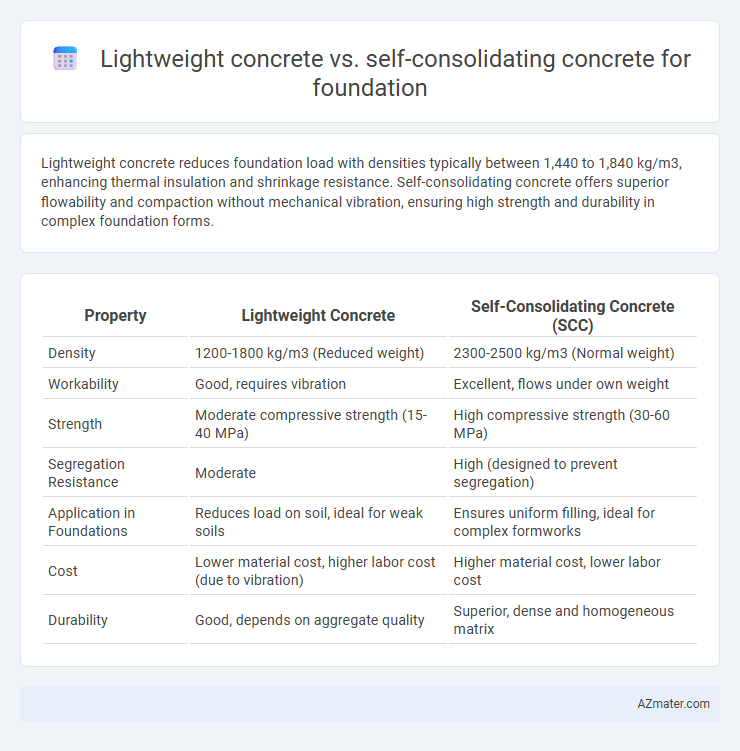Lightweight concrete reduces foundation load with densities typically between 1,440 to 1,840 kg/m3, enhancing thermal insulation and shrinkage resistance. Self-consolidating concrete offers superior flowability and compaction without mechanical vibration, ensuring high strength and durability in complex foundation forms.
Table of Comparison
| Property | Lightweight Concrete | Self-Consolidating Concrete (SCC) |
|---|---|---|
| Density | 1200-1800 kg/m3 (Reduced weight) | 2300-2500 kg/m3 (Normal weight) |
| Workability | Good, requires vibration | Excellent, flows under own weight |
| Strength | Moderate compressive strength (15-40 MPa) | High compressive strength (30-60 MPa) |
| Segregation Resistance | Moderate | High (designed to prevent segregation) |
| Application in Foundations | Reduces load on soil, ideal for weak soils | Ensures uniform filling, ideal for complex formworks |
| Cost | Lower material cost, higher labor cost (due to vibration) | Higher material cost, lower labor cost |
| Durability | Good, depends on aggregate quality | Superior, dense and homogeneous matrix |
Introduction to Concrete Types in Foundation Construction
Lightweight concrete, known for its reduced density and thermal insulation properties, is ideal for foundation applications requiring lower load on soil and improved energy efficiency. Self-consolidating concrete (SCC) offers superior flowability and segregation resistance, enabling complex foundation forms to be filled without mechanical vibration. Selecting between lightweight concrete and SCC depends on project-specific factors such as load requirements, form complexity, and construction speed.
What is Lightweight Concrete?
Lightweight concrete is a type of concrete that incorporates lightweight aggregates such as expanded clay, shale, or slate, resulting in a reduced density compared to traditional concrete. This material offers improved thermal insulation and reduced structural load, making it ideal for foundation applications where weight reduction is critical. Its lower density enhances seismic performance and reduces the overall foundation thickness without compromising strength.
What is Self-Consolidating Concrete?
Self-consolidating concrete (SCC) is a highly flowable, non-segregating concrete that can spread into place and encapsulate reinforcement without the need for mechanical vibration, ensuring superior compaction and surface finish. Compared to lightweight concrete, which reduces structural load through lower-density aggregates, SCC emphasizes workability and durability, making it ideal for complex foundation forms and congested reinforcement zones. Its unique mix design enhances performance in foundation applications requiring rapid placement and minimal labor.
Composition and Material Differences
Lightweight concrete uses aggregates like expanded clay, shale, or pumice to reduce density and improve thermal insulation, making it suitable for foundations requiring lower weight and better energy efficiency. Self-consolidating concrete (SCC) incorporates highly flowable mixtures with superplasticizers and viscosity-modifying agents, eliminating the need for vibration while maintaining strength and durability in complex foundation forms. The key material difference lies in lightweight concrete's porous aggregates versus SCC's emphasis on chemical admixtures for enhanced flowability and compaction.
Workability and Placement Techniques
Lightweight concrete offers improved workability due to reduced density, making it easier to handle and place in foundation applications, especially where load reduction is critical. Self-consolidating concrete (SCC) significantly enhances placement efficiency by flowing under its weight without the need for vibration, ensuring uniform filling around dense rebar and complex formwork in foundations. SCC's high fluidity reduces labor and speeds up construction, while lightweight concrete's lower weight minimizes foundation loads and improves thermal insulation properties.
Strength and Durability Comparison
Lightweight concrete offers reduced density and thermal insulation, providing moderate compressive strength typically ranging from 17 to 35 MPa, making it suitable for non-structural foundation elements where durability against freeze-thaw cycles is critical. Self-consolidating concrete (SCC) achieves higher compressive strengths, often exceeding 40 MPa, due to its dense microstructure and superior workability, resulting in enhanced durability against chemical attacks and reduced permeability. Both concretes can be engineered for foundation use, but SCC's higher strength and densified matrix generally deliver superior long-term durability and load-bearing capacity.
Thermal and Acoustic Insulation Properties
Lightweight concrete offers superior thermal insulation due to its porous structure, reducing heat transfer and enhancing energy efficiency in foundations. Self-consolidating concrete, while primarily designed for ease of placement and high strength, typically has denser composition resulting in lower thermal insulation but provides effective sound attenuation by minimizing air gaps and voids. Choosing between the two depends on prioritizing either enhanced thermal insulation with lightweight concrete or improved acoustic performance with self-consolidating concrete in foundation applications.
Cost Implications and Economic Efficiency
Lightweight concrete reduces foundation costs by lowering dead loads, which can decrease the size and amount of reinforcing steel needed, resulting in overall material savings. Self-consolidating concrete (SCC) enhances labor efficiency through its high flowability, minimizing vibration and placement time, which can reduce construction labor costs despite higher material expenses. Choosing between lightweight concrete and SCC should consider project-specific factors such as structural demands and site conditions to optimize economic efficiency.
Environmental Impact and Sustainability
Lightweight concrete reduces environmental impact by using recycled aggregates and lower cement content, resulting in decreased carbon emissions and improved thermal insulation for foundations. Self-consolidating concrete (SCC) enhances sustainability through reduced energy consumption and labor during placement, minimizing waste and improving durability. Both materials contribute to eco-friendly foundation construction, with lightweight concrete favoring material efficiency and SCC promoting energy-efficient installation.
Choosing the Right Concrete for Your Foundation
Lightweight concrete offers enhanced thermal insulation and reduced structural load, making it ideal for foundations in seismic zones or where weight reduction is critical. Self-consolidating concrete (SCC) excels in complex formworks or congested reinforcement areas due to its high flowability and ability to fill molds without vibration, ensuring superior surface finish and reduced labor costs. Selecting between lightweight concrete and SCC depends on foundation requirements such as load-bearing capacity, site conditions, and construction speed, with material specifications like density, compressive strength, and workability guiding the optimal choice.

Infographic: Lightweight concrete vs Self-consolidating concrete for Foundation
 azmater.com
azmater.com